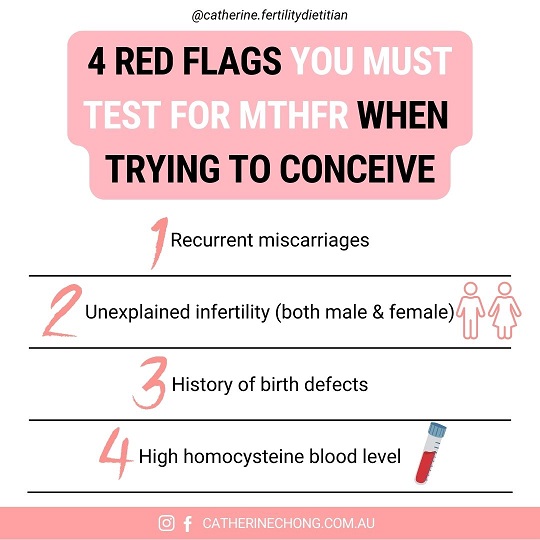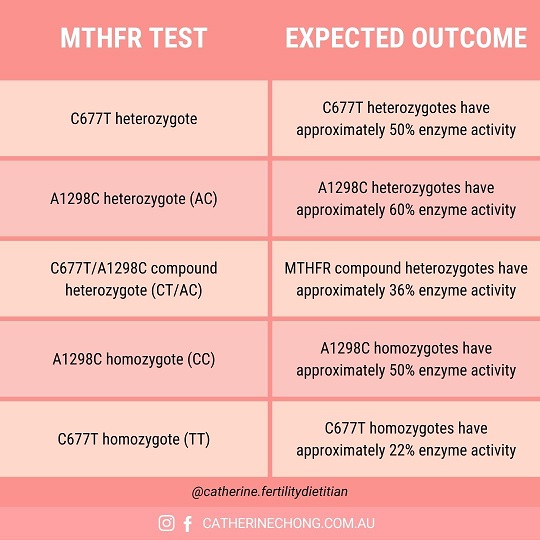How Can MTHFR Affect Your Fertility & Risk Of Miscarriage
MTHFR gene test is not a routine blood test that the doctor will order for you. But there is an increasing amount of new evidence which suggests that it is worthwhile to test for MTHFR, especially if you experience miscarriages, recurrent implantation failures or poor egg quality issues.
At Team Catherine, we have recently conducted a comprehensive review of the evidence for MTHFR and provided training for health care professionals. This blog shares what you must know about MTHFR and fertility.
What Is MTHFR?
MTHFR stands for methylenetetrahydrofolate reductase. MTHFR is the gene in our body that instructs it on how to create the MTHFR protein, and this protein is what helps our bodies to process folate.
Folate (vitamin B9) is an essential water-soluble B nutrient with many vital functions in our body, including creating DNA and other genetic material. Another critical role is to convert homocysteine to methionine as a methyl donor. Folate is also one of the most crucial nutrients for fertility and pregnancy.
MTHFR has been in the recent spotlight because MTHFR can influence how your body process folate, including folic acid.
Read more about folate vs folic acid >>
The MTHFR gene variation occurs when our DNA sequence differs from what is normal or expected. These MTHFR gene variants are common. In Australia, it is estimated that approximately 60-70% of the population has MTHFR gene variants.

Different MTHFR Variants
The MTHFR gene variants can occur in many, many different forms. Every person has two copies of the MTHFR genes, one from their mother and one from their father.
Perhaps the most commonly reported variants are C677T and A1298C. For example, the MTHFR C677T (also referred to as MTHFR 677 C>T) gene variant means, at the 677 position, changes from the expected base of C to T. Hence, a variation in the expected sequence has occurred.
See the table below for more details. (Reference from the NSW Health, www.genetics.edu.au)

So far, research studies indicate that having one or both of these variants may reduce a person’s ability to process folate. However, as I highlighted before, this is not included in a routine blood test because this does not generally cause health problems, provided that there is sufficient folate through diet or supplementation.
This is why it is so important to see an MTHFR-trained fertility dietitian so we can help assess your nutrient intake appropriately, arrange the proper nutrition-related blood tests (including the MTHFR gene test), and stop the guessing game.
Because, in reality, there is no time to waste when you’re trying to conceive, and the biological clock is ticking. We want to help you to do every step right to enhance your chances of getting pregnant, staying pregnant and having a healthy baby.
How Does MTHFR Variant Affect Female Fertility?
Most fertility research studies primarily focus on the MTHFR C677T genotype. It is associated with irregular menstrual cycles and ovulation, disrupting hormone balance, lower ovarian reserves, diminished response to follicular stimulation and reduced chance of live birth after in vitro fertilisation (IVF).
An increased risk of blood clotting occurs as the gene variant results in decreased function of the MTHFR protein and therefore increases homocysteine levels. This risk is elevated, particularly for women predisposed to other blood clotting conditions. It affects fertility as blood vessel issues and blood clots can reduce the likelihood of successful implantation and embryonic growth and potentially lead to preeclampsia. Women with two C677T, or one C677T, and one A1298C variant will often have elevated homocysteine levels and are at greater risk of preeclampsia.
Recurrent Pregnancy Loss And Implantation Failure
MTHFR gene variant has been associated with several pregnancy complications and birth defects. They include reduced rates of successful embryo implantation, increased risk of preeclampsia and miscarriage, and may be related to a higher chance of recurrent miscarriage.
A recent study found that MTHFR gene variation may potentially be a cause of recurrent miscarriage and recurrent implantation failure. Another research also found a clear relationship that shows the MTHFR gene variation can increase the risk of miscarriage.
Furthermore, pregnant women with an MTHFR variant are at increased risk of foetal developmental disorders. These complications are known as neural tube defects (NTDs), including spina bifida (where the defect occurs in the baby’s spinal cord) and anencephaly (where the defect occurs in the formation of the baby’s brain or skull).
Women who have had a previous child with a neural tube defect, a family history of neural tube defect, or have been tested with C677T homozygotes may require a higher dose of folate supplementation when planning a pregnancy. You must consult your doctor or an MTHFR-trained fertility dietitian for appropriate assessment and advice.
How Does MTHFR Affect Male Fertility?
Research on the relation between MTHFR gene variation and male infertility is somewhat conflicting. Some affect male fertility more than others, and MTHFR C677T variants affect male fertility more negatively than other variants. MTHFR gene variants have been found to affect male fertility through abnormal blood folate levels, reduced sperm quality and production and sperm DNA damage.
Blood folate levels have been strongly linked to the maintenance of normal sperm morphology and density, which shows folate’s important role in male fertility. Hence, in the case of a male with an MTHFR variation, folate regulation is interrupted, and homocysteine levels increase, which increases inflammation within the body and negatively impacts fertility.
It has been found that the MTHFR gene variation combined with elevated homocysteine levels are related to sperm abnormalities, including decreased sperm count and low sperm motility. These abnormalities were significantly lower in men with two C677T variants. Additionally, MTHFR variation is believed to contribute to male infertility through impaired sperm production. This is because sperm production is closely associated with folate metabolism, so when MTHFR variation affects folate regulation, it can impair sperm production.
Should You Test For MTHFR?
It is worthwhile to consider the MTHFR gene test if you have experience:
- Recurrent miscarriages
- Recurrent implantation failures
- Unexplained infertility
- A stillbirth or baby born with cleft lip and/or palate, neural tube defect and congenital cardiac abnormalities
- Elevated blood homocysteine level
- Thrombosis (occurs when blood clots block veins or arteries) and/or maternal family history of thrombosis
Book an initial consultation with Dietitian Catherine to learn more about the MTHFR gene test and receive your personalised fertility eating plan and supplement regimen tailored to your health. Can’t decide? We also offer a 15-minute discovery call to understand your fertility situation and whether our service is the right fit for you.
With all my love 



